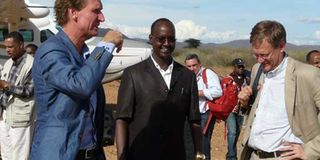UN agencies join leaders in efforts to restore peace in troubled Moyale

Head of UN delegation and UNHCR representative in Kenya Per Knutsson (Left), head of development cooperation in the embassy of Sweden Anders Ronquist (Right) and Moyale Sub-County Administrator Ambrose Harugura at the Moyale Airstrip on March 23, 2015. The UN and other development partners are in Moyale for a joint peace initiative. PHOTO | DAVID MUCHUI | NATION MEDIA GROUP
What you need to know:
- The agencies and Swedish embassy officials visited Moyale town to assess progress made by elders in maintaining peace.
- Violence rocked Moyale in 2013 leaving over 30 people dead and more than 70,000 fleeing to Ethiopia.
- UN head of delegation Rauf Mazou said they will for the next five years work with local communities in addressing the root cause of conflicts based on priorities.
- Mr Hajj Kadida said the victims had received compensation of between Sh100,000 and Sh275,000 depending on the nature of their destroyed houses.
An initiative aimed at restoring lasting peace and development in Moyale has been launched by local elders, the county government, United Nations agencies and other development partners.
Representatives of UN agencies including WFP, UN-Women, UNHCR, UNDP, Unicef, UNFPA, UNOPS and the Swedish embassy officials visited Moyale town to assess progress made by elders in maintaining peace.
This follows a wave of violence between communities that left about 30 people dead, more than 70,000 fleeing to Ethiopia and close to 100 houses torched in late 2013.
Addressing the UN delegation at Al-Yusra Hotel in Mandera Town, Marsabit County Director for Cohesion and Integration, Joseph Mirgichan said 35 elders have been setting the pace for the implementation of a peace agreement signed in Nairobi in 2014.
“The elders come from the Burji, Borana, Gabbra, Sakuye, Garre and other minority communities to ensure there is ceasefire.
“For the first time, we have even been able to recover stolen cattle from the Ethiopian side.
“We are grateful to Ethiopian communities because they sheltered our people during the clashes,” Mr Mirgichan.
WORK WITH LOCAL COMMUNITIES
The UN head of delegation Rauf Mazou said they will for the next five years work with local communities in addressing the root cause of conflicts based on priorities.
“The United Nations inter-agency initiative is a commitment to end the conflicts that have ravaged Moyale for long.
“We will be working on peace building, economic activities and nurturing cross border relations in a systematic way,” Mr Mazou said.
The Swedish head of Kenya Development Cooperation section Anders Ronquist termed the partnership between Kenya and key development partners as a major milestone in ending conflicts in the region.
Mr Mohamed Hapicha, an elder representing the Gabbra community said the residents were ready to work together in tackling common problems rather than fighting.
“We have all come together after the fighting with the resolve that we shall embrace peace.
“We have common problems which we should be tackling rather than fighting.
“A lot has been done in restoring peace such as compensating the displaced persons,” Mr Hapicha remarked.

Some of the 35 elders representing communities living in Moyale hold hands as a sign of resolve to find lasting peace during a meeting at Al-Yusra hotel in Moyale town on March 23, 2015. PHOTO | DAVID MUCHUI | NATION MEDIA
LIVES LOST, PROPERTY DESTROYED
Mr Juma Soka from the Burji community lamented that the area has been reeling from the impact of the conflict that started one year ago.
“Moyale has felt the pinch of conflict and we now know the need for peace.
“Lives were lost, property was destroyed, livestock stolen and many left homeless in the fighting. Some of us are still homeless to date.
“As elders, we have vowed to entrench the culture of peaceful cohesion,” Mr Soka said.
Another elder Mr Hajj Kadida said the victims had received compensation of between Sh100,000 and Sh275,000 depending on the nature of their destroyed houses.
“The government has helped in resettling those displaced by the conflict. It is our appeal to the international community to come in and help in concluding the process.
“There is need for interventions in health, education, drug abuse, infrastructure, cross border relations, water supply and peace building to improve security,” Mr Kadida remarked.
Over 2,000 displaced persons have been supported through the International Organization for Migration (IOM) in a project funded by Japan, Swedish International Development Cooperation (SIDA) and UN Central Emergency Response Fund (CERF).






